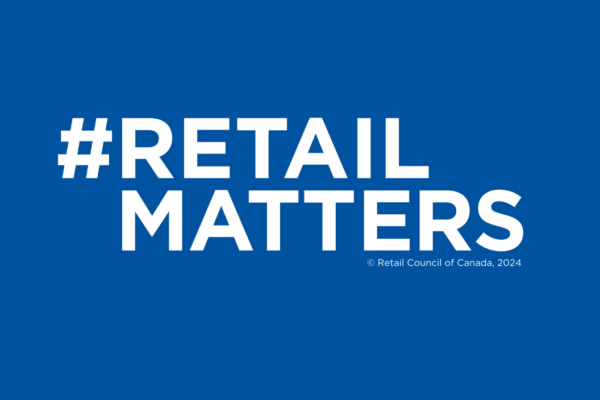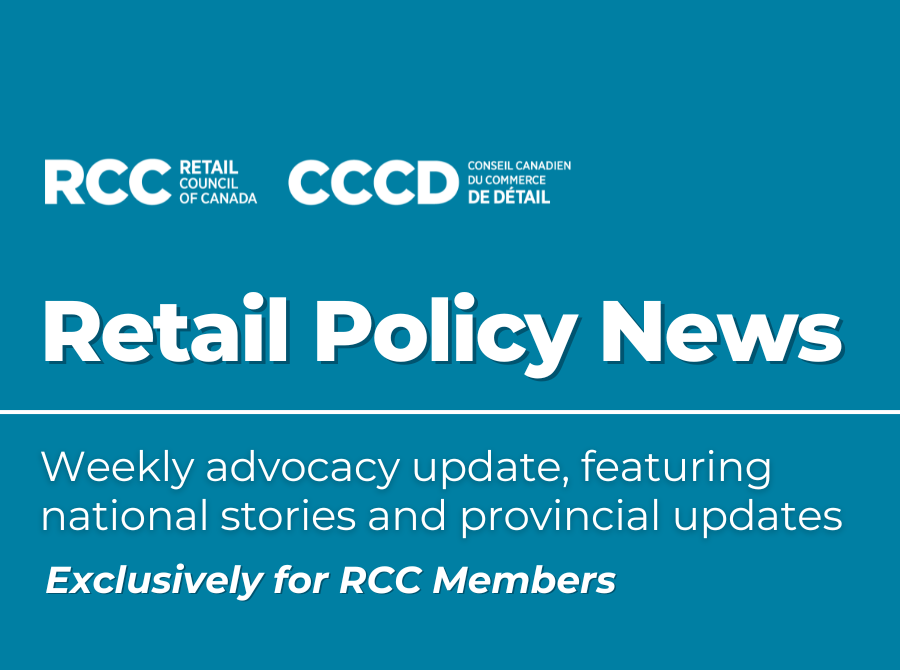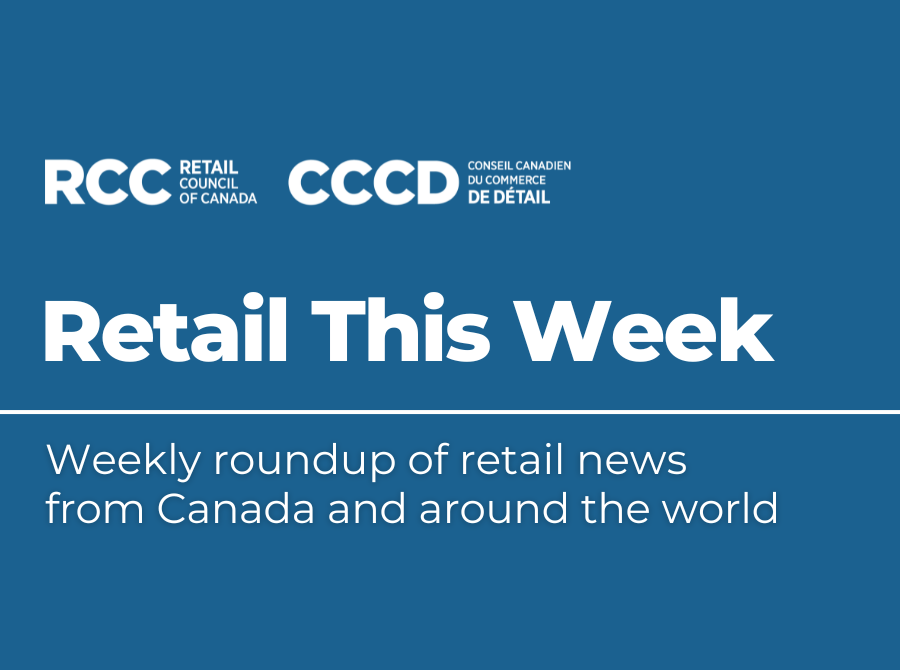Recent News and Wins

RCC Pushes for Action: Testifies on Sky-High Interchange Fees Impacting Retailers and Consumers →
Attention retailers, financial services and payment processors: RCC Senior Vice President Karl…

Saskatchewan Election Called →
Attention all voters in Saskatchewan: With the election called this week, RCC has been actively…

Letter to Minister Steven MacKinnon Regarding Potential Air Canada Labour Disruption →
September 11, 2024 The Honourable Steven MacKinnon, P.C., M.P.Minister of Labour and…

Letter to Minister Boissonnault: Temporary Foreign Worker Program Vital to Canadian Retail Industry →
The following letter was sent to Minister Randy Boissonnault from RCC President and CEO Diane J.…

Rail Operations Resume, But Delays Loom →
Last Thursday, August 22, 2024, Labour Minister Steven MacKinnon directed the Canadian…

New Restrictions on Temporary Foreign Worker Program →
The federal government has announced new restrictions to the low-wage stream of the Temporary…

CN and CPKC Rail Work Stoppage to End →
Minister of Labour Steven MacKinnon has directed the Canadian Industrial Relations Board (CIRB)…

Rail Shutdown Looms: Retailers Urged to Brace for Supply Chain Impact →
As negotiations between unions and Canadian National (CN) / Canadian Pacific Kansas City (CPKC)…
Highlighted National Wins
National RCC representatives advocate for retailers through several key pillars.

Health and Food Safety
- RCC worked to ensure proposed changes to the valuation of duty will not unduly impact retailers resident in Canada. RCC’s efforts ensured that a notice in writing was issued clarifying that the intent of the proposed changes is not to use a price in a sale between a Canadian resident importer and its Canadian customer as the basis for determining the value for duty.
- Helped keep costs down for members by successfully advocating for a pause in the increase of the farm-gate price of dairy until May 2024.
- Worked with various food supply chain coalitions to mitigate supply chain disruptions and put in place long-term strategies to ensure networks remain strong and flexible in the event of climate or disease related emergencies.
- RCC has worked to ensure reasonable timelines are in place for upcoming changes to labelling and cost recovery for Natural Health Products. Through communication with members on timing challenges, operational considerations and supply chain complexities, RCC will continue to work to ensure these changes are made in a sustainable and practical manner.
- Facilitated member compliance with food and product safety regulations through the Food Safety and Nutrition Committee and Product Safety and Recall Committee, which offer regular discussions with government and other industry partners, as well as communication on upcoming planned or contemplated regulatory changes in order to provide members with advance notice.
Responsible Sourcing
- Advocated for the meaningful and reasonable implementation of Bill S-211 – Canada’s new forced and child labour reporting law – including developing detailed recommendations with RCC’s Responsible Sourcing Committee and calling out the need for clear guidance and reasonable implementation timelines for retailers through ongoing engagement with political and government officials.
- Actively engaged in the development of a new law on labour exploitation in supply chains, preparing recommendations and advocating for meaningful, collaborative approaches that reflect the complexity of global retail supply chains.
- Secured changes to Health Canada’s Guidance for front-of-package nutrition labelling regulations that enable more cost-effective and practical compliance.
- Advocated for clear, targeted rules around the marketing of foods and beverages to children with both the Senate and Health Canada and saw RCC’s recommendations on establishing reasonable implementation timelines be incorporated into the proposed law.
- Provided member learning and engagement opportunities on animal welfare issues, with both producers and animal welfare organizations, and supported the ongoing work of the National Farm Animal Care Council, a critical organization to advance farm animal welfare in Canada through broad stakeholder collaboration.
Sustainability
Throughout 2023, RCC continued to develop online resources, expertise, and advocacy efforts based on the following three areas of sustainability:
Extended Producer Responsibility (EPR)
- Given the range of materials retailers and quick service restaurants supply into the market, including packaging and paper, electronics, tires, hazardous products and more, there is an increasing amount of end-of-life management regulatory obligations. As programs transition to full producer responsibility across the country, RCC has been actively engaged in advocacy, government consultations, and more to support members.
- Key wins include improved harmonization of regulatory definitions across provinces and phased-in timelines where programs are transitioning to full EPR.
- As there are 90+ EPR and stewardship programs across the country, RCC has also been closely monitoring system costs and performance to ensure they are cost-effective and efficient.
Plastics and the Circular Economy
- RCC has been heavily involved in federal consultations and advocacy related to the proposed minimum recycled content requirements, labelling for recyclability and compostability, federal plastics registry and pollution prevention planning notice. This has resulted in key shifts in the government’s approach to setting targets and criteria (e.g., lower recyclability thresholds for labelling) due to the need for more evidence-based research.
- RCC continues to engage with municipal, provincial and federal governments, from bureaucrats to Ministers, to ensure retail’s voice is heard when discussing and implementing single-use plastic bans for items including bags, utensils, food service ware, and more.
- In October, RCC met with Federal Minister of Environment and Climate Change, Steven Guilbeault, expressing alignment with the objective of zero plastic waste while cautioning that plastics policies like the pollution prevention planning notice, if rushed and not thoroughly assessed, could lead to significant consequences. For example, more inflation in an already sensitive environment or potentially adverse environmental impacts. RCC and broader industry stakeholders are keen on working with the federal government to collectively develop evidence-based policies towards an optimal circular economy.
- RCC met with the Canadian Council of Ministers of the Environment (CCME) to provide an overview of challenges and opportunities in the EPR and plastics regulatory landscape across the country. Harmonization of definitions and regulations was emphasized to drive efficiency, consistency, and progress towards a circular economy, urging CCME members to align regulations and collaborate with industry for collective success.
- As a founding partner of the Canada Plastics Pact, RCC continues to take part in discussions with stakeholders from across the plastics value chain through regular Partner Meetings and involvement in CPP’s Reuse Working Group.
- RCC has partnered with ECCC for a series of workshops to support increased engagement between RCC’s members and government on a range of topics including labelling, chemicals, plastics and more. The first hybrid workshop was held in October in Toronto.
Environmental, Social and Governance (ESG) Reporting and Climate Action
- RCC continues to strengthen relationships with key government departments and knowledge partners including Transport Canada, Natural Resources Canada, Environment and Climate Change Canada, KPMG, the International Sustainability Standards Board, Bullfrog Power, CDP and more.
- This has resulted in numerous presentations and member discussions through RCC’s bi-monthly ESG & Climate Action Committee on refrigeration protocols, reducing greenhouse gas emissions, sustainability disclosures, and renewable energy solutions.
- Earlier this year, Natural Resources Canada invited RCC to participate in a Zero-Emission Vehicle (ZEV) Council alongside other industry partners, NGOs and provincial governments to help further innovation, adoption of EVs and scaling of charging infrastructure across the country.
For questions or more information contact
Karl Littler
Senior Vice-President, Public Affairs
klittler@retailcouncil.org
416- 467-3783

For questions or more information contact
Kate Skipton
Senior Policy Analyst, Government Relations
kskipton@retailcouncil.org
416 467-3744

For questions or more information contact
Rui Rodrigues
Executive Advisor, Loss Prevention and Risk Management
rrodrigues@retailcouncil.org

For questions or more information contact
Michael Zabaneh
Vice President, Sustainability
mzabaneh@retailcouncil.org

For questions or more information contact
Avery Bruenjes
Senior Manager, Government Relations and Regulatory Affairs
abruenjes@retailcouncil.org

For questions or more information contact
Matt Poirier
Vice President, Federal Government Relations
mpoirier@retailcouncil.org

Highlighted Regional Wins
RCC has representatives who advocate for retailers on regional issues across Canada.
- B.C. released a landmark Single-Use and Plastic Waste Prevention Regulation on July 14, 2023 that comes into effect on December 20, 2023. RCC has worked to advocate for clarity and solutions to unintentional consequences of the government’s regulation. The tight time-frame and intransigence of government have both contributed to make this work difficult. RCC has gained some clarity that improves the outcomes – particularly for small business, food retailers and quick-service restaurants.
- B.C. has introduced ‘gig worker’ legislation. RCC’s work on this front has primarily been to inform government of the wide array of activities for which internet-based applications are used in an effort to ensure that those are not, unintentionally, caught up in the ‘gig worker’ regime. At this point, while the enabling legislation is before the legislature but some of the most significant details will be contained in regulations that will follow the passage of the legislation.
- RCC has continued to advocate the industry’s concern about the safety of retail workers and workplaces. Higher levels of crime and increasing gang activity have not gained sufficient attention from government. RCC’s efforts have been to convince B.C.’s NDP government of the important impacts of retail crime on communities in an effort to encourage them to take action on crime. There has been limited progress on this front – the major improvement in 2023 is increased awareness by elected officials.
- B.C. created a precedential pay transparency regime to promote gender equity. RCC continues to work with government to ensure that RCC members are aware of the requirements of the new act and regulations.
- WorkSafeBC increased inspections of retail workplaces for musculo-skeletal injury prevention programs. RCC contracted with a respected egronomist to create a retail workplace-specific set of tools to answer the WorkSafeBC requirements.
- B.C.’s government created the first extended producer responsibility obligations in North America – and continues to establish significant precedents within Canada. In 2023, RCC participated in several initiatives to inform changes:
- RCC participates in a Commercial Packaging and Paper Product Working Group to examine options for the management of small commercial business waste in smaller communities. This process feeds into an upcoming discussion paper about options for managing commercial waste province-wide expected in 2024.
- RCC has continued to provide leadership with Producer Responsibility Organizations working on behalf of retailers to manage (residential) packaging and paper products, beverage containers, major appliances and consumer electronics.
- RCC has worked to answer government questions leading toward a 2024 amendment to the Recycling Regulation which will likely change language surrounding online marketplace sales, extend the obligation to cover more packaging, electronic and battery products, and, newly obligate mattresses and pressurized containers (principally fire extinguishers and propane cannisters).
- Yukon’s government has passed legislation to enact extended producer responsibility for packaging and products in the territory. Regulations are forthcoming shortly. The first obligation will be placed on packaging and paper products. RCC has worked with members in the territory, elected officials, and Department of Environment officials to express our concerns. Our concern is that because of the small population of the territory (45,000) spread over the large land mass of the territory, that programming equivalent to southern Canadian jurisdictions would create a significant cost-burden for Yukon consumers to manage the packaging and paper product waste
For questions or more information contact
Greg Wilson
Director, Government Relations and Regulatory Affairs
gwilson@retailcouncil.org

Alberta: RCC’s Regional Hub
- Completed a comprehensive Alberta labour market study that has better identified issues and solutions to address retail recruitment and retention challenges being experienced across Canada. Lead a coalition of business groups to focus on making changes to Saskatchewan’s employment standards that are burdensome on retailers.
- Effectively secured retail related platform commitments through RCC’s Vote Retail provincial election campaigns in Manitoba and Alberta.
- Expanded the number of opportunities for RCC and its members to meet with officials and participate on environmental boards and committees, ensuring the retail sector’s perspective is heard. Appointed by the Government of Alberta as a founding member of the province’s oversight body, and continue to Chair Multi-Material Stewardship Manitoba – keeping us well positioned on two important files.
- Secured Government reappointment to the board of the Alberta Recycling Management Authority at a critical period when the province is rolling out its framework for extended producer responsibility. This initiative is anticipated to transfer hundreds of millions of recycling costs from taxpayers to industry and retailers.
- Hosted an exclusive RCC member event with Premier Jason Kenney that provided a unique opportunity to directly ask the Alberta government about its support of the retail sector.
- Ensured Alberta introduced eviction protection as an incentive for landlords to work with retailers.
- Built mutually valued relationships across Alberta’s government to allow for quick response times to member 411 and 911 issues.
Saskatchewan: Regional Hub
- Effectively advocated to push back on Wave 4 COVID-19 related restrictions, including considerations to add Proof of Vaccination requirements in Saskatchewan.
- Ensured retail employers were incorporated into the new Saskatchewan Immigrant Nominee Program designed to address hard-to-fill positions, including low and entry level positions.
- Pushed for refinements to COVID-19 retail guidelines for Saskatchewan that reduced costs and improved operating flexibility for apparel, grocery, and other sectors.
- As part of RCC’s election advocacy, secured a commitment by the governing Saskatchewan Party to maintain PST and the predictable CPI linked minimum wage model.
Manitoba: RCC Regional Hub
- Effectively secured retail related platform commitments through RCC’s Vote Retail provincial election campaigns in Manitoba and Alberta.
- Expanded the number of opportunities for RCC and its members to meet with officials and participate on environmental boards and committees, ensuring the retail sector’s perspective is heard. Appointed by the Government of Alberta as a founding member of the province’s oversight body, and continue to Chair Multi-Material Stewardship Manitoba – keeping us well positioned on two important files.
- Successfully achieved the inclusion of most Manitoba retail workers in a government essential worker risk recognition collective benefit of $60 million or $1, 377/employee.
- Directly influenced the expansion of the “essential retail” guidelines, and subsequently the updating of operating requirements to ensure safety, however lower cost, and operating constraints.
- Achieved and participated in the introduction of a Bill that will allow retailers to establish their own Sunday and Holiday hours in Manitoba.
For questions or more information contact
John Graham
Director, Government Relations (Prairies)
jgraham@retailcouncil.org
204 926-8624

- Integral in instigating an Ontario Energy Board (OEB) consolation on new methods to price power to retail stores. Early research from the OEB suggests the alternative models of pricing could mean an average savings of 10.7 per cent on energy costs for businesses.
- Supported the distribution of rapid test kits through RCC’s pharmacy and grocery members, in addition to ongoing advocacy to see COVID-19 restrictions reduced.
- Worked with the Ontario government in 2021 to demonstrate research findings that confirmed minimal virus transmission within retail stores. These findings lead to earlier reopening and reduced restrictions.
- As a result of RCC advocacy, licensed grocery stores can now offer curbside pickup of beer, wine, and, cider, and are able to sell alcoholic products from 7am to 11pm. Stores can now also cross-promote beer, cider, and, wine with some non-alcohol products.
- Advocated for provincial level harmonization for a variety of topics, including masking.
- Ensured retail restrictions made sense. This included working to exempt employees from store capacity calculations, and modifications to screening guidance for staff and third-party visitors.
- Following an RCC-led push on municipalities to exempt retail and restaurant delivery vehicles from noise by-laws, and a subsequent Ontario-wide emergency order, RCC successfully delivered legislation enacted in September 2021 that permanently exempted all Ontario retail/restaurant/DC deliveries from municipal noise by-laws and encouraging off-peak deliveries.
- Lobbied for changes to the Ontario Blue Box Regulation, including exemptions for food-protection products, changes to the rule creation threshold, and the scope of eligible sources, such as parks and public spaces.
- Supported the development of the Producer Responsibility Organization (PRO), Circular Materials. RCC continues to act as the Secretariat to ensure producers have an industry-led, not-for-profit option.
- In 2nd COVID-19 wave, actively pushed province to remove non-essential vs essential restrictions and allow all retailers to open with capacity limits.
- Worked with the majority of Ontario’s 34 Public Health Units to push the removal of fines from a retailer when customer fails to wear/remove mask.
- Secured moratorium on evictions for unpaid rent as well as deferral of provincial and municipal taxes & other regulatory burdens.
- Secured 24-hour truck delivery in Ontario allowing for expanded hours, shorter delivery times and reduced fuel consumption.
- Served members as trouble-shooter/intervenor with local health authorities, police and bylaw enforcement to ensure reasonableness of approaches during the crisis and to avert tickets for infractions. In Ontario, this meant frequent conversations with enforcement, and provincial governments, keeping many business’ curb-side sale operations open, as well as Ontario-based distribution centres.
- Worked with governments and local authorities to protect curb-side activity during pandemic. In Ontario, this included actively pushing definitions with SOLGEN to allow many retailers to operate curb-side throughout Stage 1. As Ontario provides additional clarity over its “Second Wave” rules, RCC continues to push a narrative supportive of curb-side, and preventing further shutdowns of bricks-and-mortar retail, in contrast to other service industries.
- Protecting retailers against frivolous COVID-19 lawsuits and insurance premium increases by pushing for a “best effort” duty of care for compliance with health laws. In Ontario, a bill is currently in committee which, if passed, will enact protection.
- Worked with governments to keep merchants open for as long as possible within public health constraints at the outset of the crisis and to re-open early in the recovery period, relative to other service industries. In Ontario, this meant delaying original restrictions, and keeping the first ‘essential business definition’ broad in scope. It meant several changes to what types of retail construction projects were ‘essential’, as well as timely reopening of garden centres, to save the commercial season.
- Obtained reasonable rules for dressing-room use and for quarantining of tried-on apparel and footwear.
For questions or more information contact
Sebastian Prins
Director, Government Relations (Ontario)
sprins@retailcouncil.org
416 467-3759

- Bill 96: Since the adoption of Bill 96 in 2022, modifying the obligations regarding the language, the RCC has worked closely with the office of the Minister of the French Language, Mr. Roberge, as well as with the Office québécois de la langue française (OQLF). While waiting for a new regulation about signs and labelling, we received the Minister to a RCC political breakfast, so that retailers could ask him face-to-face questions about the new obligations and regulatory changes. RCC’s efforts have been considered by the government, about some adaptation to allow Quebec companies to do business, which shows that the Minister was listening to our concerns.
- Bill 29: Since the introduction of Bill 29 – which became Act 21 following its adoption – RCC has been working hard to ensure that retailers’ voice is heard in the National Assembly. RCC met with many Minister’s offices and was subsequently invited to Quebec City to make recommendations. By participating in the consultations, RCC was the only economic organization representing Quebec retailers, was able to highlight retailers’ openness to the principles of the bill as well as their realistic and concrete position to better protect consumers. Discussions also continued with the Office de la protection du consommateur (OPC) to assert our positions. Despite some difficulties, we managed to be heard, to include retailers in the process and to remove the obligation to display the duration of the legal warranty (which had to be close to the price, as obviously as the price of the good). We will work to ensure that the regulations that will follow in the coming months are applicable to retailers.
- Bill 19: The office of the Minister of Labour met with RCC to hear our concerns and concerns about certain provisions of the bill. We met many times the Minister Jean Boulet, and welcomed him for a political breakfast. He was able to meet with industry representatives and discuss this issue, among other things. RCC prepared and submitted a brief based on consultation with members. As a result of our efforts, there will be some flexibility in the law.
- Formerly Bill 64: RCC met with the Chair of the Commission d’accès à l’information (CAI) to work more closely with the Commission on future obligations and to further inform retailers. At the end of November, the Chair of the IAC, Diane Poitras, met with RCC members to discuss, among other things, the difficulties of harmonizing Quebec laws with those of other Canadian jurisdictions.
- Deposit System: A huge ecosystem will be set up over the next two years with the expanded deposit system, which will cover 5 billion containers in more than 1,000 drop-off locations. While this is an Extended Producer Responsibility (EPR), we have worked hard to ensure a better understanding of retailers’ operational issues. After three versions of the regulations (the last of which was published last August), we have added a deferral for materials that present a particular challenge, such as milk containers and wine bottles. Phase 1, which allowed for the addition of aluminum containers of less than 2 L, went smoothly, thanks to countless meetings and initiatives by retailers (setting up a project office and the retailer-producer transition committee, conducting several studies, analyses on actual costs and legal opinions, development of affiliation agreements between retailers, etc.). Phase 2 will start in March 2025, and we are already working on it.
- Advocated to remove the establishment of a public health rating in Bill 99, an act to amend food product safety.
- Pushed to allow for consultation in 2022/23 for a draft regulation modifying the current food regulation before the final regulation is sanctioned in 2024/25.
For questions or more information contact
Michel Rochette
President, CCCD – Québec
mrochette@cccd-rcc.org

For questions or more information contact
Apraham Niziblian
Directeur, Relations gouvernementales et Affaires publiques (Québec)
aniziblian@cccd-rcc.org

- Continued work as a liaison between RCC members, Emergency Measures Organizations, Senior Government Officials, the Salvation Army and the Red Cross to engage in advance planning for emergency events / provide support to those in need – across all Atlantic Provinces – following emergency events (e.g.: 2023: Hurricane Lee / analysis of response to Hurricane Fiona in 2022).
- Advocated for predictability and fairness for RCC members as each Atlantic Province reviewed its minimum wage.
- Each Atlantic Province expanded the scope of service for pharmacists (e.g.: mild to moderate eczema, mild acne, etc.) to help alleviate the strain on the health care system.
- Successfully pushed the Atlantic provinces to take harmonized actions to combat COVID-19. This included rules surrounding government inspections, mandatory non-medical mask wearing and the creation of an Atlantic Bubble to provide retailers with access to additional customers.
- Succeeded in giving most Atlantic retailers the choice to remain open during the 1st wave of COVID-19 and giving all retailers this choice during the 2nd wave.
Prince Edward Island: RCC’s Regional Hub
- Continued push back against government and opposition initiatives to consider a guaranteed annual allotment of ten paid sick days for PEI workers.
- Continued advocacy for the interests of RCC members as the government ponders legislation in response to a recent report that reviewed the province’s Employment Standards Act. The review is causing push from stakeholder groups for changes in the definition of an employee (related to gig workers) and a manager, hours of work, a new minimum wage formula, leaves of absence (regular and for severe illness), paid and unpaid sick days, and the minimum allowable age for work.
- Retail crime: ongoing meetings with the Minister of Justice and Public Safety, senior bureaucrats, police, etc. to work towards solutions.
Newfoundland & Labrador: RCC’s Regional Hub
- Working with RCC members, government officials and interested stakeholders as the province consults on the development of an extended producer responsibility model for packaging and printed paper.
- Ensured that the addition of new items to the existing electronics stewardship program were harmonized with those in Nova Scotia, New Brunswick and PEI.
- Consulted with government as regulations related to its Pay Transparency Act continue to be developed.
- Continued work with Marine Atlantic and Oceanex to ensure retailers can get their products to the people of Newfoundland and Labrador.
- During the storm of November 2021 and resulting washout of TransCanada Highway and throttling of the crucial Port-Aux-Basques harbour, RCC Atlantic worked daily with Marine Atlantic, the Premier’s Office, and Emergency Measures Office to successfully open the much smaller and seasonal Marine Atlantic dock in Argentia (east coast) during the two-week highway shutdown. RCC continues to coordinate with the Red Cross, various levels of government, transportation companies, and members to ensure that retail products are provided to people during times of need.
For questions or more information contact
Jim Cormier
Director, Government Relations (Atlantic)
jcormier@retailcouncil.org
902 422-4144

Get Breaking News
RCC members have access to a wide variety of resources to help retailers stay informed.

#VoteRetail
RCC’s #VoteRetail election resources give you answers about where parties stand on key retail issues in your region and ways to get involved.

Retail Policy Newsletter
Looking for more RCC advocacy updates? Become an RCC member to subscribe to our Retail Policy Newsletter, which provides weekly updates on important retail matters.

Retail This Week Newsletter
Always stay informed on the latest in retail by subscribing to Retail This Week: Free for RCC Members and non-members alike.






